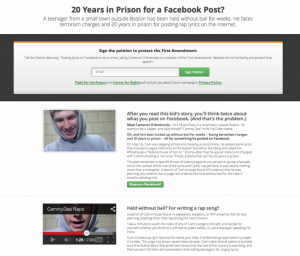Protecting personal data and privacy online
This forum aims to encourage and continue the lively and constructive debate and presentations which took place at LCC on 15/11/2012 part of UALs enterprise week, see more about this event and other topics here.
After you read this kid's story, you'll think twice about what you post on Facebook. (And that's the problem.) 
Meet Cameron D'Ambrosio. He's 18 and lives in a small town outside Boston. He wants to be a rapper and calls himself "Cammy Dee" in his YouTube videos.
Oh, and he's been locked up without bail for weeks -- facing terrorism charges and 20 years in prison -- all for something he posted on Facebook.
On May 1st, Cam was skipping school and messing around online. He posted some lyrics that included a vague reference to the Boston Marathon Bombing and called the Whitehouse a "federal house of horror." Shortly after that he was arrested and charged with Communicating a Terrorist Threat, a felony that carries 20 years in prison.
The post contained no specific threat of violence against any person or group of people, and in the context of the rest of the lyrics and Cams' rap persona, it was clearly nothing more than a metaphor. A search of Cam's house found NO evidence that he was planning any violence, but a judge still ordered him held without bail for the next 3 months, pending trial. Read more
Libraries to store all UK web content - Millions of tweets, Facebook status updates and even a blog about a bus shelter in Shetland are to be preserved for the nation. The British Library and four other "legal deposit libraries'" have the right to collect and store everything that is published online in the UK.
http://www.bbc.co.uk/news/entertainment-arts-22028738
Privacy may soon be a thing of the past See - http://www.telegraph.co.uk/technology/9913452/Is-the-digital-age-rewiring-us.html
Talking in 2010, Mark Zuckerberg, the founder of Facebook, announced that privacy is no longer a “social norm”. In the future, data on our habits and movements – where we’ve been and what we’ve done – will be available to anyone who wants to know. Thanks to image-recognition software, we’ll be able to identify anyone who we point a phone at; when we shop online, prices will be tailored according to our income and willingness to pay; and when we go to the airport, aviation authorities will know so much about the minutiae of our lives it will no longer be necessary for us to queue for security. In fact, there is so much personal data on the web that Eric Schmidt, the co-founder of Google, has warned that teenagers might be forced to change their names one day in order to escape their cyber past.
Boom! Curtis Woodhouse just scored a knockout blow for every athlete who's ever been harassed by sports trolls on Twitter.
Boxer hunts down Twitter troll http://mashable.com/2013/03/11/boxer-hunts-down-twitter-troll/#lead-image … via @mashable well done @woodhousecurtis #jimmybrownpants
http://mashable.com/2013/03/11/boxer-hunts-down-twitter-troll/#lead-image
Twitter becomes latest hacking victim - A quarter of a million Twitter users have had their accounts hacked in the latest of a string of high-profile internet security breaches... How serious should we take 3rd party software communication, myblog.arts (wordpress) was recently hacked and loads of spam added to accounts. Is this another good reason (security/spam and bots) for creating and managing your own community spaces for a more real official/endorsed method of community communication and not make 3rd party channels so seriously? - http://www.bbc.co.uk/news/technology-21304049


Penetration testing: 'One false click' can let hackers in - http://www.bbc.co.uk/news/technology-22598028